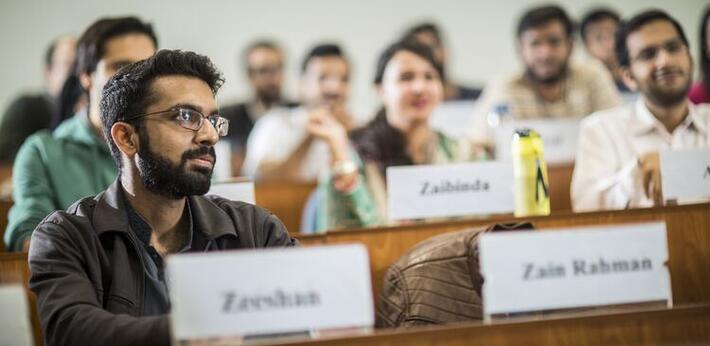You are here
Home ›10/11/2023
Foreign universities can now set up in India
India’s University Grants Commission (UGC) has released its regulations for setting up and operating campuses of 'foreign higher educational institutions' (FHEI) in any part of India. This follows an eight month long public consultation on the draft regulations by the UGC, to which the UK sector contributed feedback through the British Council.
FEHIs ranked in the global top 500, either overall or in relevant subject areas, are eligible to apply to set up a branch campus in India. They can also set up as a consortium with other FEHIs, as long as each partner fulfils the eligibility criteria. FHEIs are defined in the regulations as universities or other educational institutions that are authorised to offer academic and research programmes at the undergraduate or higher levels within and outside their home country.
FHEIs setting up an IBC in India should ensure that the quality of education provided will be same as that at the main campus in the institution’s home country and that the qualifications awarded will have the same recognition and equivalence to the qualifications awarded in the main campus, and should submit an undertaking to this effect as part of their application. FHEIs will also be able to set up multiple campuses in India, but a separate application must be submitted for each campus.
What is different from the draft regulations?
- IBC approval is no longer limited to a set time period, in contrast to the draft regulations which specified a 10-year operation period with the possibility of a further 10-year extension.
- The FEHI will have the autonomy to decide salary and other terms and conditions for the faculty and staff it appoints for the IBC, but the qualifications of the appointed faculty must be similar to those at the home campus.
- The regulations clarify that the reasonable period to stay in India for the appointed foreign faculty to teach at the IBC should be ‘for at least a semester’.
- The regulations state that IBCs cannot deliver programmes in online, Open or Distance Learning modes, although online lectures are allowed to contribute up to 10 per cent of the programme requirements.
- It is suggested that FEHIs may consider tuition fee concessions to students who are Indian citizens. However, FHEIs’ autonomy to decide and set the fee structure for admitting domestic and foreign students and eligibility for scholarships stays.
- The approval period for both the Standing Committee and the UGC in reviewing applications and readiness of the IBC has been extended from 45 days to 60 days.
- A clause has been added on receiving and use of donations from any foreign sources. Prior permission of the Central Government will need to be obtained and compliance with the India’s Foreign Contribution (Regulation) Act, 2010.
British Council comments
Over a decade after its first attempt, which initially met with a lot of resistance, the Indian government has finally succeeded in bringing in regulations to establish IBCs in India. The UGC which is responsible for determining and maintaining standards of teaching, examination and research in universities as well as funding of domestic HEIs, has the powers to bring out such regulations. This is one of the major ambitions in India’s National Education Policy (NEP) 2020 and is consistent with the various internationalisation initiatives led by the Indian HE sector and the government.
India has the world’s largest university age population and has seen phenomenal growth in study abroad over the last few years. There is still untapped demand for international education as was found in one of our research studies which showed that 50 per cent of surveyed students would have liked to study abroad if their finances permitted.
In 2021/22, the total number of foreign students enrolled in Indian HEIs was 48,035, with students coming from 163 different countries. While India has relatively few globally ranked universities compared to its size, it does have a number of institutions that are recognised worldwide, which combined with affordable fees and living expenses help the country to attract students from South Asia and Africa. The Indian government is also aggressively promoting Study in India to attract more foreign students to India, and one of the government’s goals in introducing branch campuses to the country is to attract overseas as well as local students.
Australia continues to position itself strongly in India. Western Sydney university has already announced its intention to set up an IBC in Bangalore under these regulations. Two Australian universities who committed to set up their IBCs in GIFT City – a special economic zone which has its own regulations for branch campuses – are already preparing to start delivery of programmes from the next academic year. In a recent VC delegation visit from Australia, six agreements were signed between Australian and Indian universities to work together to explore the potential for a consortium approach for delivery of degrees in India and expand access to Australian higher education for Indian students.
A recent British Council report on Indian student mobility to the UK has identified demand for the UK qualifications in key states and cities at sub-national level, finding that this demand is spreading to tier 2 and tier 3 cities but that these are highly price sensitive markets. The demand is likely to grow, but risks remain around price sensitivity and competition. Based on this, the report data might be useful to explore possible locations for IBCs.
Sources and further information
Setting Up and Operation of Campuses of Foreign Higher Educational Institutions in India Regulations, 2023 (UGC, November 2023) https://www.ugc.gov.in/pdfnews/Setting%20up%20and%20Operation%20of%20Campuses%20of%20Foreign%20Higher%20Educational%20Institutions%20in%20India.pdf
Western Sydney University to set up campus in Bengaluru: Australian education minister (Indian Express, November 2023) https://indianexpress.com/article/education/western-sydney-varsity-to-set-up-campus-in-bengaluru-australian-education-minister-9016472/
Mapping international student mobility in India (British Council, October 2023) https://opportunities-insight.britishcouncil.org/news/reports/mapping-international-student-mobility-india






